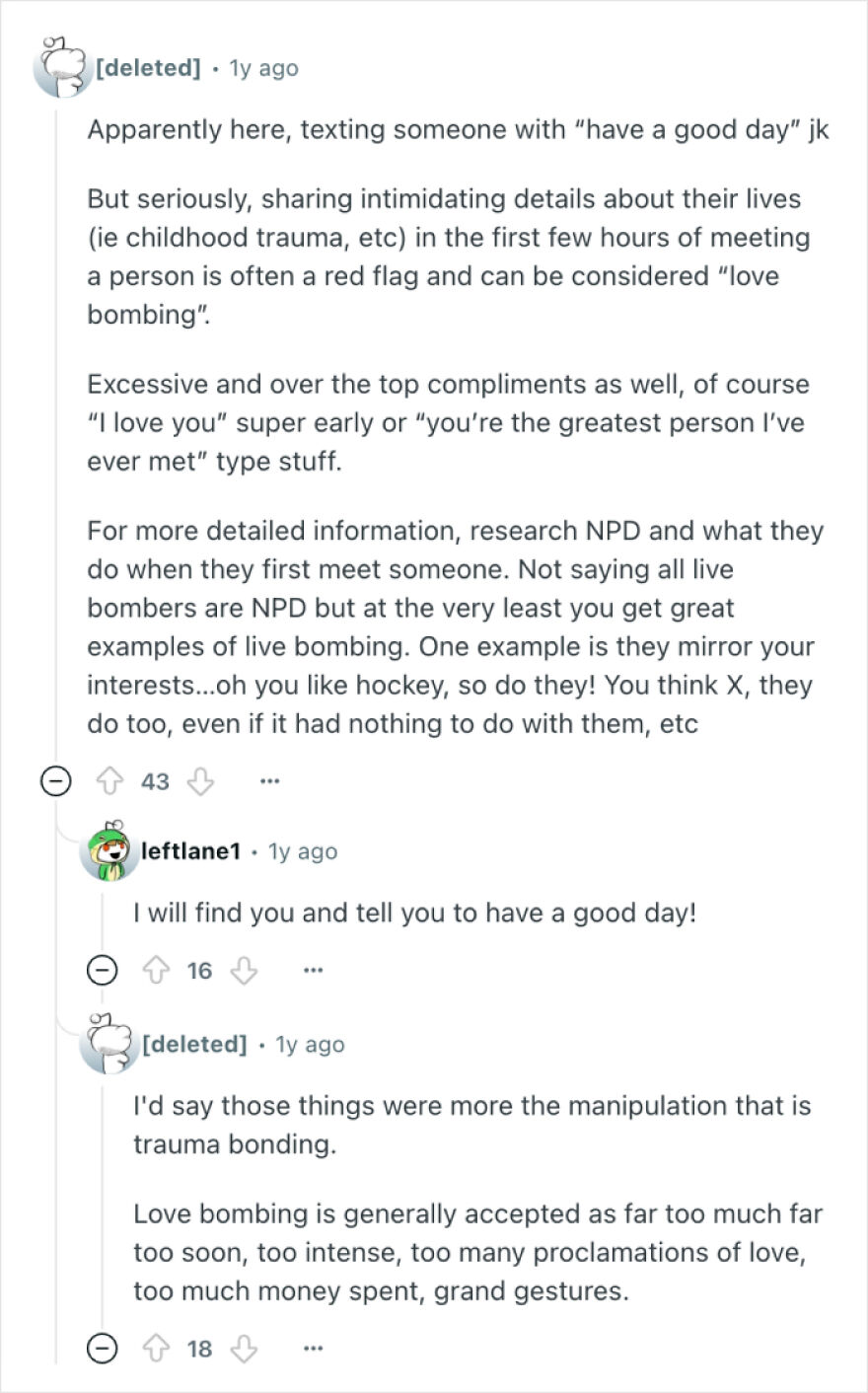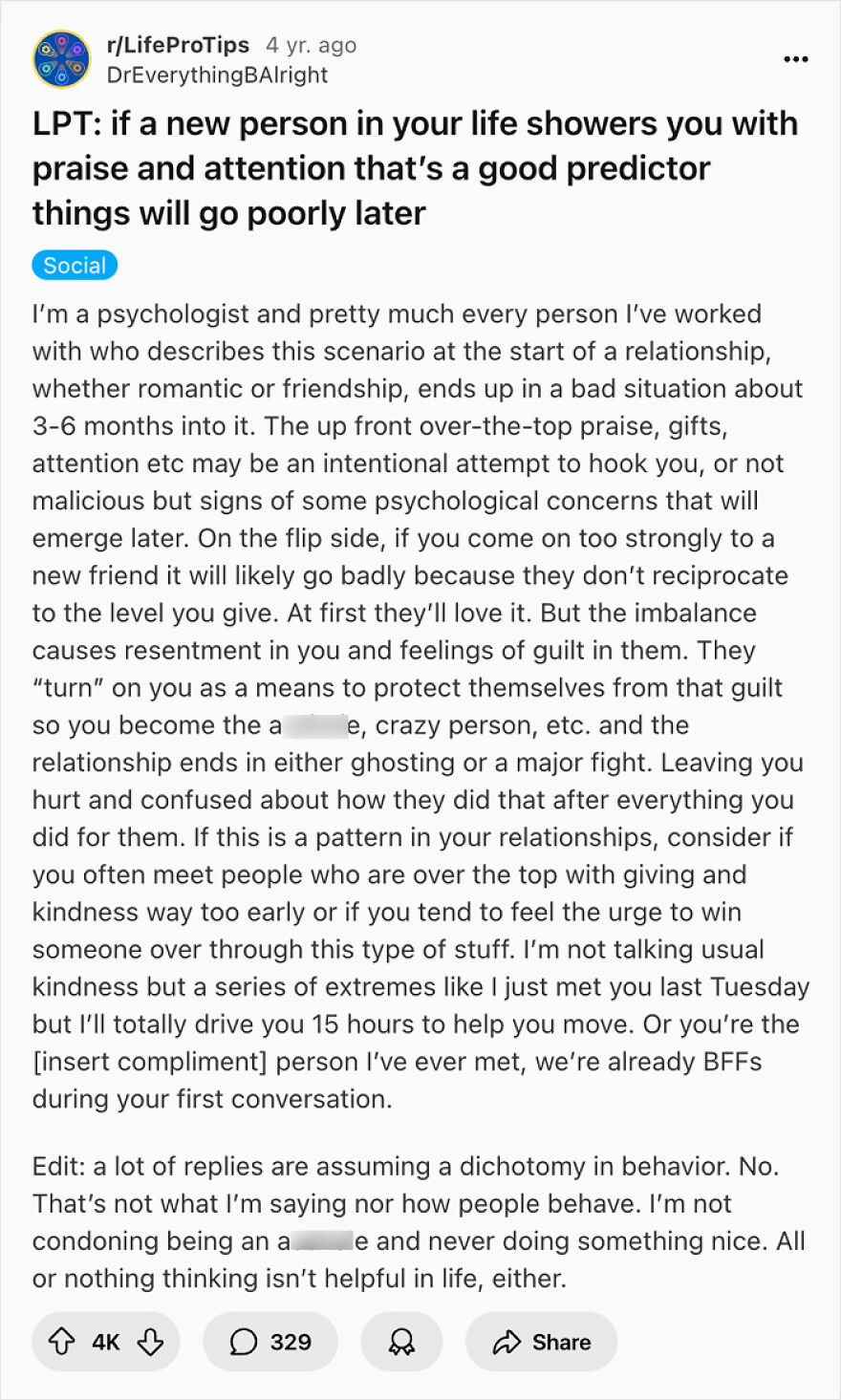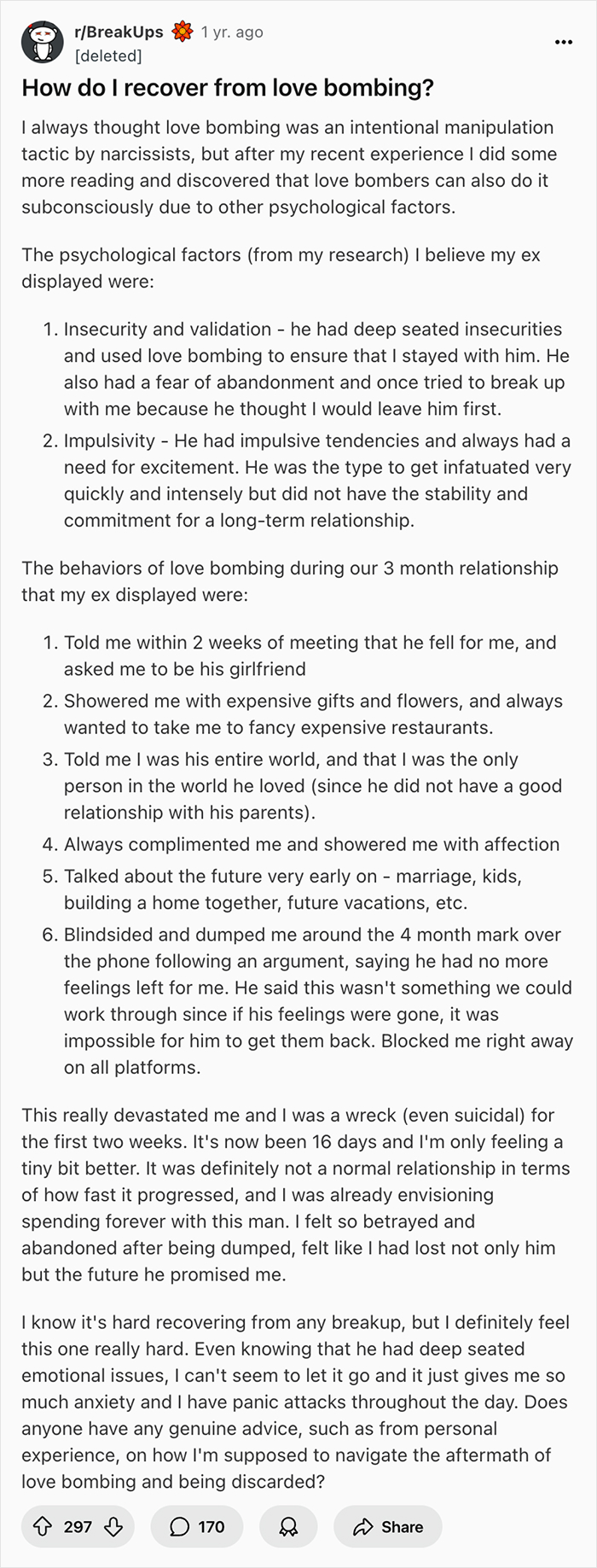A Tinder study shows how easy it is to mistake red flags for green lights. What feels like affection, generosity, or attentiveness might actually be a mask for control or manipulation.
That subtle shift from charming to concerning can catch anyone off guard. In the sections ahead, you’ll find expert advice, real-world stories, and research-backed tips to help you spot when things aren’t as sweet as they seem.
This article has been reviewed for accuracy and context by Dr. Sarah Meehan O’Callaghan, an interdisciplinary researcher whose work explores culture, gender, and psychology. Her expertise ensures the insights presented are well-grounded and credible.
Lightning‑Fast Future Planning
Healthy relationships develop over time. While early excitement is natural, rushing into big plans within the first few weeks can be a sign of love bombing, where excessive affection is used to gain control or create emotional dependence.
Experts caution that fast-forwarding emotional milestones can derail organic relationship growth. Clinical psychology professor Miriam Steele told Verywell Health that love bombing imagines a relationship that doesn’t yet exist.
Psychologist Mert Şeker, speaking to Marriage.com, also warns that early overplanning can result in “a superficial relationship, where you only know each other on a surface level.”
Meanwhile, on Reddit, one r/relationship_advice user asked, “What constitutes love bombing early in a dating relationship?”
Replies described extreme behaviors like proposals, major life planning, or deeply personal confessions after just a few days, highlighting how a slow, steady rhythm is often the real green flag.

Flood Of Compliments Is a Huge Red Flag
Compliments feel like a sweet perk of a new romance, but they may do more than lift your mood when they come in floods. Excessive praise early on can be a calculated tactic to create emotional dependency, drawing someone into a dynamic where they start relying on their partner for validation and self-worth (via Verywell Health).
One Reddit thread in r/LifeProTips captured this perfectly. A psychologist chimed in, warning that over-the-top admiration early in a relationship is often a red flag for later dysfunction. The behavior sets up unrealistic expectations and emotional imbalance.

This concern is echoed on social media, too. Heartbreak strategist @ericleffler points out that these floods of praise are rarely about you. Instead, they serve the other person’s agenda, which makes them feel hollow and performative.
Things often worsen when the affection becomes inconsistent. As PsychCentral notes, this pattern, called intermittent reinforcement, trains emotional dependence. The sudden withdrawal of attention leaves you chasing validation, even when it’s no longer freely given.
Round‑The‑Clock Availability
Being available all the time might seem romantic in the early days, but constant messaging or lightning-fast replies can signal something more troubling, like insecurity or a need for control.
The issue isn’t with frequency, but the pressure it can create. Psychologist Netta Weinstein told Scientific American that “silent moments can be powerful ways to connect.”
That idea is echoed in a tweet by @Ifenimi: “Silence becomes the evidence of love that has outgrown performance.”
In other words, the healthiest relationships allow room for pause. If someone panics or lashes out when you’re not constantly chatting, it could hint at emotional overdependence rather than genuine intimacy.
These habits are often rooted in attachment styles. A 2013 study in Computers in Human Behaviour explains how people with avoidant tendencies prefer emotional space, while anxious individuals crave contact to feel secure.
So if constant communication feels either suffocating or soothing, that reaction might say more about someone’s emotional wiring than their level of interest.
Public Affection Overdrive Might Be Jealousy
A little PDA can feel sweet, but when it’s constant or showy, it may say more about the couple’s insecurity than their closeness. Performative public affection, whether in person or plastered across social media, can signal overcompensation, jealousy, or a desire to project a perfect relationship.
Psychologist Gwendolyn Seidman, Ph.D. notes that excessive PDA often correlates with lower relationship satisfaction. And as Psychology Today explains, some influencers stage elaborate romantic gestures for the camera, raising doubts about whether the affection is genuine or simply curated for clicks.
This disconnect between display and reality shows up offline, too. A viral moment on Reddit captured a man reaching into the back of his partner’s shorts in public, sparking more cringes than admiration.

The top comment joked about hygiene, but the real takeaway was clear: not all affection is romantic when it feels performative.
Research backs this up. A 2022 study published in Sage Choice found that private affection shared in quiet, meaningful moments was more closely tied to relationship quality than public displays.
Lavish Gifts On Day One
Receiving flowers or a thoughtful present early on can feel romantic, but when the gifts are extravagant right out of the gate, it’s worth taking a closer look. Experts say this is often a form of love bombing where generosity isn’t about affection, but about creating emotional debt.
Counselor Dr. Nadine Macaluso explains that love bombing can include over-the-top gifts to impress or overwhelm. As Verywell Health notes, these gestures may be designed to foster dependency rather than connection.
Real-life examples make the pattern clearer. On Reddit, one user shared their experience of being flooded with expensive gifts and elaborate dates within two weeks. The relationship quickly soured, leaving them emotionally unmoored.

It can also be financial entrapment. Domestic violence advocate Ashley Bendiksen told SELF that some partners offer to pay bills or rent as a way to gain control. When this happens early on, it’s a setup for dependence.
Mirroring Your Every Interest Is Toxic
Liking the same movies, music, or hobbies as your new partner might feel like a rare connection, but when that match seems too perfect, it could be something else.
Psychological research has identified narcissistic mirroring as a manipulation tactic, used to manufacture closeness by mimicking another person’s interests and personality (via Simply Psychology).

Image credits: Everton Vila / Unsplash
This behavior often shows up in real-life stories. In r/TrueNarcissisticAbuse, users described narcissists as chameleons, people who change who they are based on the person they’re dating. As one commenter said, “They copy your identity traits…but at the end of the day, they don’t know who they really are.”
Another user, @badnewsfaery, recalled how his ex became a superfan of whatever sport her new partner liked, only to drop it as soon as the relationship ended.
This kind of identity-shifting may reflect instability.
That instability is also seen in some personality disorders. Both Narcissistic Personality Disorder (NPD) and Borderline Personality Disorder (BPD) involve blurred self-identity and a tendency to mirror others.
According to Talkspace, this can create the illusion of a deep connection, but it often reveals toxic behavior hiding beneath compatibility.
Agreeing With Everything You Say
It might feel flattering when someone shares all your opinions, but nonstop agreement in a relationship isn’t always a good sign. When a partner mirrors your beliefs without question, it may point to conflict avoidance rather than real compatibility.
This pattern can seem calm on the surface, but it tends to build resentment underneath. Psychology Today explains that avoiding disagreement may keep the peace temporarily, but it often results in emotional disconnection.
Psychologist Dr. Gloria Lee echoes this concern in an Instagram post, explaining that avoidance slowly erodes trust and intimacy, whether the relationship is new or long-term.
And it’s not just about everyday conversations. As Well & Good notes in an interview with Dr. Jeanne Safer, parroting political or moral views without conviction may be just a mask to avoid tension.
Overprotective Chivalry Might Be an Abuser
Sometimes, the first warning sign is holding doors, picking up every check, and taking over small tasks uninvited. While this kind of over-the-top chivalry looks like romance, it can hint at control rather than care.

Image credits: Devon Divine / Unsplash
Feminist scholars argue that this kind of overprotectiveness can quietly undermine autonomy. Ms. Magazine explains how insisting on doing everything for her often reinforces outdated gender roles and subtly communicates that she’s incapable or dependent.
That illusion of care can quickly turn possessive. On TikTok, @soul_repair describes relationships where overprotectiveness escalates into control. These partners monitor movements, grow jealous easily, and slowly isolate their significant others, all under the guise of being “loving.”
When that kind of attention begins to cut off outside relationships or dismiss independence, it becomes a red flag wrapped in charm.
Trauma Dumping Early in the Relationship
Sometimes, what feels like openness in a relationship is actually a fast-track to emotional entanglement.
One Reddit user in r/datingoverforty described a pattern of dates unloading stories of loss and heartbreak within weeks of meeting. It made them uncomfortable, manipulated, and eventually, ready to walk away.
Verywell Mind clarifies the difference between healthy vulnerability and trauma dumping. When deep disclosures arrive before mutual trust or emotional boundaries exist, the dynamic becomes one-sided and overwhelming.
To avoid getting pulled into emotional quicksand, anxiety therapist Kelly McKenna advises a simple rule: protect your bandwidth. If someone’s trauma overshare feels out of place, it’s okay to set a boundary.
Social Media Love Bombs
Before the first argument or even the first serious talk, there’s the Instagram post: a long caption, a filtered selfie, a declaration of undying love. It looks romantic, but sometimes, it’s the first clue that a relationship is more about appearances than intimacy.

Image credits: Josh Garner / Unsplash
Journalist Aidan Kearney shared one such moment on X, calling it out plainly: “This is called love bombing.” The idea behind it is that when affection is aimed more at followers than at your partner, it becomes a red flag in disguise.
That concern also shows up on other platforms. In a viral TikTok, @chelseabermann suggested that excessive online praise might signal underlying unhappiness. User noted that if you’re constantly broadcasting your love, you may be trying to convince yourself it’s real.
Backed by research, the suspicion holds weight. A study in Psychology of Popular Media Culture found that couples who post more about their relationships often report lower satisfaction.
Rushing To Meet Your Family
It sounds flattering: you’ve barely started dating, and they want to meet your parents. But beneath the surface, this eager integration can be less about excitement.
According to Verywell Health, rushing emotional milestones is a common love-bombing tactic. Introducing someone to family early can create artificial intimacy and emotional obligation, making it harder to walk away later.
Narcissistic abuse recovery coach Liliya Labonté illustrates this dynamic on TikTok, noting that some people rush family introductions to entangle you quickly.
She describes how abusers later weaponize those ties, saying things like, “I told my whole family about you, how could you leave me now?”
She advises voicing any feelings early and observing the response. Manipulators may initially agree with your boundaries but often follow up with guilt-laced check-ins to keep pulling you in.
Deleting Dating Apps Right After a Match’s Response
Before you even remember their last name, they announce they deleted all their dating apps for you. It’s framed as devotion, but it could just as easily be manipulation dressed up as loyalty.
The move can create emotional pressure: “I deleted mine for you, why haven’t you?” According to Verywell Health, fast-tracking emotional steps like exclusivity can give one partner the upper hand before trust has had a chance to grow.
Pugnacious Lomax tackled this in a Quora thread, advising that unless there’s been an explicit conversation, there’s no rush to delete anything. Mutual clarity should come first, whether you’re texting daily or meeting occasionally.
Therapist Sarah Kahan, speaking to Brides, agrees: “In the beginning, you want to see if there is commonality… and that takes time.” Real connection shouldn’t need shortcuts.
Footing Every Bill With Strings
Sometimes, generosity comes with a receipt.
The National Network to End Domestic Violence reports that economic control shows up in nearly all domestic violence cases. Financial generosity, when used to create dependency, is one of the quietest but most common forms of abuse.

Image credits: Priscilla Du Preez / Unsplash
Research backs this up. A study in the Journal of Social and Personal Relationships found that people who base their self-worth on money face more financial conflict in relationships. A different study by the American Sociological Association showed that economic dependence increases the risk of infidelity.
Personal stories often bring this dynamic into sharper focus. On r/AskWomenOver30, one woman described how she burned through her savings and moved in with an older partner who began setting the rules.
She ended up stuck in constant conflict, unable to leave until she paid off debt, and commenters urged her to dip into retirement savings just to get out.
Daily Grand Gestures Isn’t Honesty
Not every sweeping romantic move is a sign of sincerity. Sometimes, the bigger the gesture, the more it’s trying to distract from what’s missing.
A study led by sociology professor Jacqui Gabb at The Open University found that couples who prioritize daily interactions like brewing coffee or texting a quick check-in tend to be more satisfied than those relying on grand romantic flourishes.
Gabb put it plainly: “Routine daily interactions are at the core of how families and couple relationships function.”
That message echoed in a viral Instagram reel shared by @lifewithshawnda, showing a woman receiving an oversized bouquet.
While many men criticized her as undeserving, one comment reframed the scene entirely: “The guy who will win your heart won’t spend a penny.”
Hyper‑Frequent Check‑Ins
According to the Australian Institute of Family Studies, one in four young people think it’s okay for a partner to know their device passcodes.
A smaller group even believes it’s fine to track a partner’s location. Those attitudes reveal how easily constant communication can slip into coercive control.
The Crown Prosecution Service outlines what this looks like on the ground: isolation, restrictions, threats, and emotional erosion that lead to trauma-like symptoms.
Trauma coach @candicetamara_ expands on this, pointing out that anxious attachment can make constant contact feel soothing, even when it’s unhealthy.
That insight is backed by research in the European Journal of Investigation in Health, Psychology and Education, which found anxious individuals tend to crave reassurance and feel heightened stress in relationships.
 Follow Us
Follow Us




